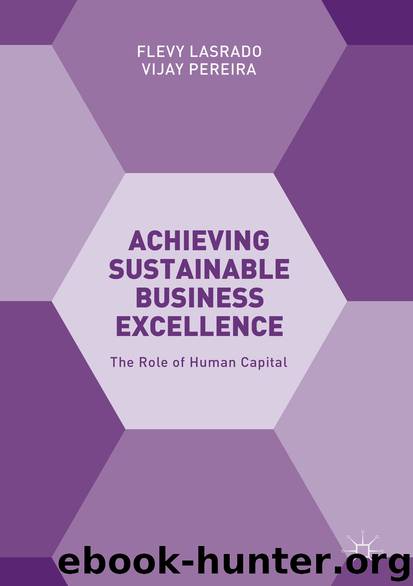Achieving Sustainable Business Excellence by Flevy Lasrado & Vijay Pereira

Author:Flevy Lasrado & Vijay Pereira
Language: eng
Format: epub
Publisher: Springer International Publishing, Cham
Competition
Do your employees consider the Idea Management system as a competition to test their ability in any way?
Competition refers to creating a sense of competing amongst employees to test their abilities. Organisations don’t run the scheme as a competition but make participation optional and at employees’ will.
The first factor on the assessment framework is leadership and work environment. It consists of indicators such as top management support, supervisor support, organisation support, communication, support for innovation and co-worker support. The main questions to be addressed in assessing the leadership and work environment factor are given in Table 6.7.
Table 6.8 explains the questions needed to evaluate system capability.
Table 6.9 explains the questions needed to evaluate system effectiveness.
Table 6.10 explains the questions needed to evaluate organisational encouragement.
Table 6.11 explains the questions needed to evaluate system barriers.
Finally, the framework was refined in light of the three case studies conducted. Robson defines a case study as ‘a strategy for doing research which involves an empirical investigation of a particular contemporary phenomenon within its real life context using multiple sources of evidence’. Yin (2004) proposes that case studies can be used for validation to check if certain theories are correct—the exact objective of the testing phase. According to Yin (2004), a case study design should be considered when (a) the focus of the study is to answer ‘how’ and ‘why’ questions; (b) you cannot manipulate the behaviour of those involved in the study; (c) you want to cover contextual conditions because you believe they are relevant to the phenomenon under study; or (d) the boundaries are not clear between the phenomenon and the context. The purpose of using case studies for this research is to determine how the factors in an evaluative framework are to be used to assess the sustainability of Idea Management systems. It would not be possible to develop assessment criteria without having a true picture of how the necessary factors influence the sustainability of Idea Management systems without considering the context within which it occurs. Therefore, the case study method is applied here because it can be used to examine what might be the practices that influence the sustainability in Idea Management systems. The analysis of the case study was used to understand the sustainability stages and to identify a list of practices associated with each of the factor indicators on the initial, developmental, and advanced stages.
Download
This site does not store any files on its server. We only index and link to content provided by other sites. Please contact the content providers to delete copyright contents if any and email us, we'll remove relevant links or contents immediately.
The Brazilian Economy since the Great Financial Crisis of 20072008 by Philip Arestis Carolina Troncoso Baltar & Daniela Magalhães Prates(133832)
International Integration of the Brazilian Economy by Elias C. Grivoyannis(110311)
The Art of Coaching by Elena Aguilar(53195)
Flexible Working by Dale Gemma;(23285)
How to Stop Living Paycheck to Paycheck by Avery Breyer(19719)
The Acquirer's Multiple: How the Billionaire Contrarians of Deep Value Beat the Market by Tobias Carlisle(12314)
Thinking, Fast and Slow by Kahneman Daniel(12267)
The Radium Girls by Kate Moore(12018)
The Art of Thinking Clearly by Rolf Dobelli(10455)
Hit Refresh by Satya Nadella(9126)
The Compound Effect by Darren Hardy(8949)
Tools of Titans by Timothy Ferriss(8369)
Atomic Habits: Tiny Changes, Remarkable Results by James Clear(8326)
Turbulence by E. J. Noyes(8040)
A Court of Wings and Ruin by Sarah J. Maas(7821)
Change Your Questions, Change Your Life by Marilee Adams(7760)
Nudge - Improving Decisions about Health, Wealth, and Happiness by Thaler Sunstein(7693)
How to Be a Bawse: A Guide to Conquering Life by Lilly Singh(7472)
Win Bigly by Scott Adams(7184)
